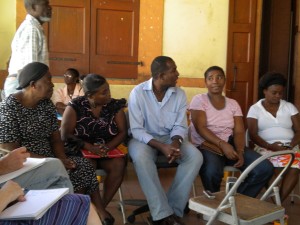by Meena Jagannath. Originally posted at AlterNet
A recent New York Times op-ed offers only half the picture.
What is the point of doing any work in Haiti? After all, the country is a mess and it’s hard to shake that habit. And its reputation.
Athena Kolbe and Robert Muggah’s December 9 New York Times op-ed illustrates in detail the post-rape reality for a survivor of sexual violence in Haiti – a series of misfortunes that encapsulate all of Haiti’s failings in responding to rape. Yet the authors make no mention of the hard work of many groups that have been trying to improve the country’s reputation.
The story is so vivid and real that I can imagine Wendy recounting it to me and my former colleagues at the Bureau des Avocats Internationaux (BAI) office in Port-au-Prince. Yet, it does Haiti a disservice by focusing on the negative, failing to mention the numerous efforts to combat rape in Haiti, and the numerous successes, since the earthquake. As the work of my colleagues at BAI and collaborators at women’s grassroots organizations like KOFAVIV (see also MADRE) and FAVILEK demonstrates every week, the story does not have to play out that way.
Yes, Kolbe and Muggah paint an accurate picture, but it’s not the whole picture. This year was an extraordinary year for the gender-based violence world in Haiti, though there is still much work to be done. For example, after over a year, and in some cases two years, of kicking around in the justice system, four of BAI’s cases went to trial in this past summer’s court session. The rape survivor prevailed in all four cases, and the perpetrator was sentenced to the maximum prescribed punishment in three of the four cases.
These trials presented tremendous opportunities for public education and influencing a traditionally patriarchal institution (the Haitian justice system) that does not have a history of taking sexual aggression cases seriously. Accordingly, women’s groups and victims’ groups turned out in numbers to support each prosecution, women’s groups held press conferences both during and after the court session, and BAI held trainings for the women’s groups to discuss the trials.
Similarly, advocacy by a primarily woman-lawyer panel of victim-side lawyers made an impression on the court. The lawyers talked not only about the individual case, they discussed sexual violence as a societal problem arising from a context of historical gender discrimination and stigmatization.
More generally, during this summer’s criminal court session, the trial court of Port-au-Prince (Tribunal de Premiere Instance de Port-au-Prince) heard an unprecedented number of rape cases – 22 out of a total of 78 criminal trials were for rape. Of these, 13 resulted in convictions with just one acquittal. Decisions on the eight remaining cases are unknown, as the court did not post those results.
These numbers are a testament to the hard work of lawyers and activists who dedicate their lives to improving women and girls’ access to health and legal services, despite the odds. These advocates have been relentless in applying pressure on the Haitian government and international community to address gender-based violence, while marshaling the resources necessary to help women and girls get the crucial health and legal help they need (as documented in Beyond Shock).
Laws on the books are one thing; actually using them and making them work is quite another. Haiti’s legal system, like any other, will never work fairly without pressure, and it is precisely the experience of pushing the cases through the system, together with media pieces like Kolbe and Muggah’s, that allow advocates to diagnose dysfunction in the system and determine how to fix it. But we must be careful that as we mete out our censure, we recognize the concrete opportunities to change the course of stories like those of Wendy and other women. There is a lot of work being done to create, sustain and expand the deterrent effect intended by public criminal trials, and thus a blanket dismissal of the system as useless, without qualification or acknowledging efforts to change it, undercuts the effectiveness of prosecutions as a mechanism for preventing future crime.

